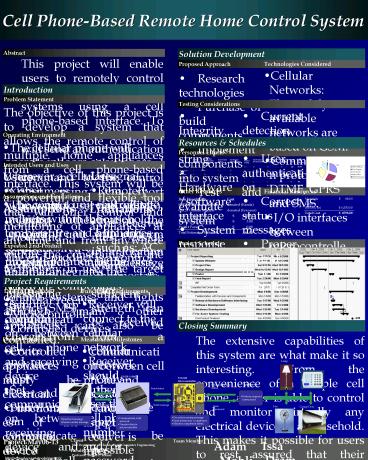Abstract PowerPoint PPT Presentation
1 / 1
Title: Abstract
1
Cell Phone-Based Remote Home Control System
Solution Development
Abstract
This project will enable users to remotely
control their home appliances and systems using a
cell phone-based interface. To access the system,
the user will send an authentication code along
with a desired command to the control unit using
the short message service (SMS). Upon
authentication, the control unit will perform the
desired command and return a status message back
to the user.
Technologies Considered
Proposed Approach
- Cellular Networks The widely available networks
are based on GSM. - Communication protocols DTMF, GPRS and SMS.
- I/O interfaces between microcontroller and
devices Serial or parallel I/O
- Research technologies
- Purchase or build components
- Implement components into system
- Test and evaluate system
Introduction
Problem Statement
Testing Considerations
The objective of this project is to develop a
system that allows the remote control of multiple
home appliances from a cell phone-based
interface. This system will be a powerful and
flexible tool that will offer control and
monitoring of appliances at any time and from
anywhere within the constraints of the technology
in use. The target appliances include climate
control systems, and lights although many other
appliances can also be controlled.
- Integrity of message string
- Hardware/software interface
- System response time
- Power supply testing
- Current detection circuit
- User authentication
- Correct status messages
- Proper control device operations
Operating Environment
Resources Schedules
- The cellular phone will operate indoors or
outdoors, wherever a cellular signal exists - The control unit will operate indoors within the
temperature and humidity limitations required for
the proper operation of the hardware
Personnel Efforts
Total Hours
Project Reporting
End-Product Demonstration
End-Product Documentation
End-Product Testing
End-Product Implementation
End-Product Design
Technology Consideration and Selection
Problem Definition
Labor Cost (10.30/hr)
Intended Users and Uses
56
10
25
25
50
5
13
6
Adam Mohling
1,957
190
178
50
10
20
35
35
5
18
5
Chau Nguyen
,1833
- Uses
- Remotely controlling household appliances such
as AC, lights, fans, thermostats, etc.
- Users
- Consumers who want to monitor and/or control
household appliances from a remote location
184
55
10
15
30
35
5
28
6
Issa Drame
1,895
74
52
0
0
0
0
5
11
6
Arturo Palau
762
8
0
0
0
8
0
0
0
0
Other Resources
82
634
213
30
60
98
120
20
70
23
Total
6,530
Other Resources
Financial Resources
Assumptions and Limitations
Item Description Cost
STK300 Microcontroller donated (Kanda)
GM28 Cellular Module donated (Ericsson)
Misc. Components 65.00
Final Project Enclosure 3.00
Project Poster 0.00
Total Estimated Materials 68.00
Materials 68.00
Labor (10.30/hr) 6,530.00
Total Cost 6598.00
Project Schedule
Expected End-Product
- The end-product is a control unit that integrates
the following components - Cellular receiver
- Microcontroller
- Controlled devices
Project Requirements
Design Objectives
Functional Requirements
- Receiver will connect to the cellular network.
- Receiver should authenticate user through cell
phone number and/or password - Receiver will parse and interpret (ASCII) text
- Microcontroller in receiver will control the
electrical appliances through I/O interface - Microcontroller should return status message
- Set up communication between cell phone and
receiving device - Set up communication between receiving device and
microcontroller - Implement control circuit interface from
microcontroller to electrical appliances
Closing Summary
The extensive capabilities of this system are
what make it so interesting. From the convenience
of a simple cell phone, a user is able to control
and monitor virtually any electrical device in a
household. This makes it possible for users to
rest assured that their belongings are secure,
that the garage door is shut, and that the
television was not left running when they left
the house.
Design Constraints
Measurable Milestones
- Controlled appliances must be electrical.
- Functionalities of the controlled device
- Battery and power converter ratings
- Capabilities of the microcontroller
- Communication between cell phone and receiver
- Hardware aspect of the receiver is
inter-connected - Implement control circuit from microcontroller to
appliances
GM28 Cellular Module
STK300 Microcontroller
Cell Phone
Appliances
Send completion status
- Perform required
- instructions
Issue command
- Decode incoming message
- Send instruction to appliance
- Monitor completion status
- Communicate with
- network
- Transfer data to
- microcontroller
- Send text message
- Receive status message
Client ISU Department of Electrical and
Computer Engineering Faculty Advisor Professor
Ahmed E. Kamal
Project May06-13 Website http//seniord.ece.iast
ate.edu/may0613/
Team Member
Issa Drame (EE) issad_at_iastate.edu Arturo
Palau (EE) apalau_at_iastate.edu
Adam Mohling (CprE) mohbandy_at_iastate.edu
Chau Nguyen (EE) chayman_at_iastate.edu

